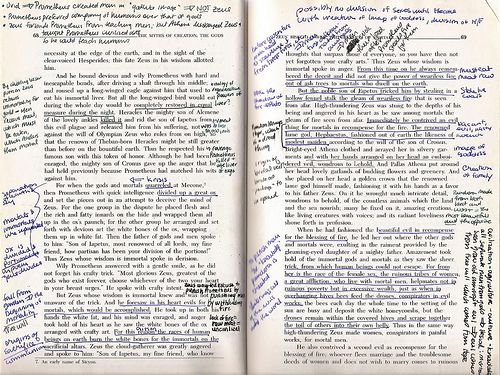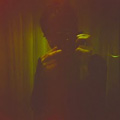You have no items in your cart. Want to get some nice things?
Go shopping
For my dissertation at university, I did a comparative investigation of four of my favorite books of fiction and their big screen adaptations: Lolita, Revolutionary Road, Breakfast at Tiffany’s and Raymond Carver’s short story, ‘So Much Water So Close To Home’. Particularly, I wanted to analyse the shift in ideology when the same story is translated from one medium to another.
To do this, I had to re-read all of them. I went through each book with post-it notes and a pencil, highlighting pages and underlining important passages that I thought revealed something about the characters and the story. Then I went through them all over again and made notes about the highlighted passages – what I thought they mean, what else they might mean, what they really mean.
It was wonderful to see what came out for me from these pages. Lines of description and dialogue that, on first reading, sped by, now had a certain resonance. I could feel the shifts in the plot and the moments when the characters’ feelings changed towards each other. It was as if the writers were peering over my shoulder saying, “See what I did there?”
Upon completing my dissertation I felt like I knew these stories better than I ever had before. I had considered these among my favourite books, yet before I studied them for my dissertation I had only read them once before. Had I really understood them the first time around? If I hadn’t, how could I have called them my favourites?
This has been on my mind a lot recently. For a long time I have been reading widely and voraciously. I usually read anything that catches my eye or that has been recommended to me and often, if I enjoy one writer, I’ll read all their books in quick succession. However, I’ve been thinking lately that it’s more beneficial to read only half a dozen books and to know them really well than to read everything you can find.
Some Twitter friends helped me in my search to find writers who have mused on the idea of closer reading, and we found these:
Owing to the flood of shallow books which really are exhausted in one reading, the modern mind tends to think every book is the same, finished in one reading. But it is not so. And gradually the modern mind will realize it again. The real joy of a book lies in reading it over and over again, and always finding something different, coming upon another meaning, another level of meaning. It is, as usual, a question of values: we are so overwhelmed with quantities of books, that we hardly realize any more that a book can be valuable, valuable like a jewel, or a lovely picture, into which you can look deeper and deeper and get a more profound experience very time. It is far, far better to read one book six times, at intervals, than to read six several books.
― D.H. Lawrence, Apocalypse
Curiously enough, one cannot read a book: one can only reread it. A good reader, a major reader, an active and creative reader is a rereader. And I shall tell you why. When we read a book for the first time the very process of laboriously moving our eyes from left to right, line after line, page after page, this complicated physical work upon the book, the very process of learning in terms of space and time what the book is about, this stands between us and artistic appreciation. When we look at a painting we do not have to move our eyes in a special way even if, as in a book, the picture contains elements of depth and development. The element of time does not really enter in a first contact with a painting. In reading a book, we must have time to acquaint ourselves with it. We have no physical organ (as we have the eye in regard to a painting) that takes in the whole picture and then can enjoy its details. But at a second, or third, or fourth reading we do, in a sense, behave towards a book as we do towards a painting. However, let us not confuse the physical eye, that monstrous masterpiece of evolution, with the mind, an even more monstrous achievement. A book, no matter what it is—a work of fiction or a work of science (the boundary line between the two is not as clear as is generally believed)—a book of fiction appeals first of all to the mind. The mind, the brain, the top of the tingling spine, is, or should be, the only instrument used upon a book.
– Nabokov, ‘Good Readers and Good Writers‘
Over the past few weeks I have been looking at my ‘TO READ’ pile, wondering what I should pick up next. In the queue are books by Chandler, Dostoevsky, Easton Ellis, Updike and Asimov, yet nothing has drawn me to them. I often find myself thinking, “I want to read that, but not right now.”
I guess if I can’t move forward with my reading list, I should go backwards. What I want to do is to revisit some of my favourite books to see if I’ve missed anything, to try to understand them better. Just my favourites. I don’t want to study every book I’ve read – that might destroy their magic. I still love the books I studied for my dissertation and the way that they became illuminated for me, but at the same time, I have no desire to return to them again any time soon. All the plot shifts, changing emotions and key lines of dialogue are still at the back of my mind, their revelations too fresh.
No, I just want to re-read my favourites, the ones I left behind soon after my discovery of them. But perhaps this time I’ll leave the post-it notes and pencil out of it.

About N/A N/A
Alex writes short stories and occasionally things a little bit longer. He has had fiction published in places like Wilderness House LIterary Review, Metazen and Spectre Magazine and has a story in the National Flash Fiction Day anthology Jawbreakers. He is currently working on a collection of stories, a novella and his blog at alexthornber.wordpress.com.




I wrote my dissertation all about ‘Lolita’ and it’s depiction through book covers, which involved me re-reading ‘Lolita’ many, many, many times. I got something new out of each time I read the story up, and by the end of it, felt I knew the characters as well as my close friends. It was a fantastic revelation to me, and yes, I stopped reading new things and took some time to re-read some older books. The one that has struck me the most is “Northern Lights”, which was my favourite book when I was 12, but I missed so much due to my naivety of my age. Good luck in re-reading!
(Patricia Meyer Spanks wrote a book called “re-reading” all about… funnily enough, rereading. I recommend it as the one new book to read, as it will help you develop ways to help yourself reread.)
That sounds really cool, I’d be interested to read that. I love Lolita. Have you read the annotated version?
I have had that same feeling. I was once chatting to someone and told them a story ‘that happened to a friend’ only to immediately realise it was from a book. Felt a bit stupid, my friend (the real one) laughed at me.
Thanks for the recommendation, I’ll check that one out.
All the best